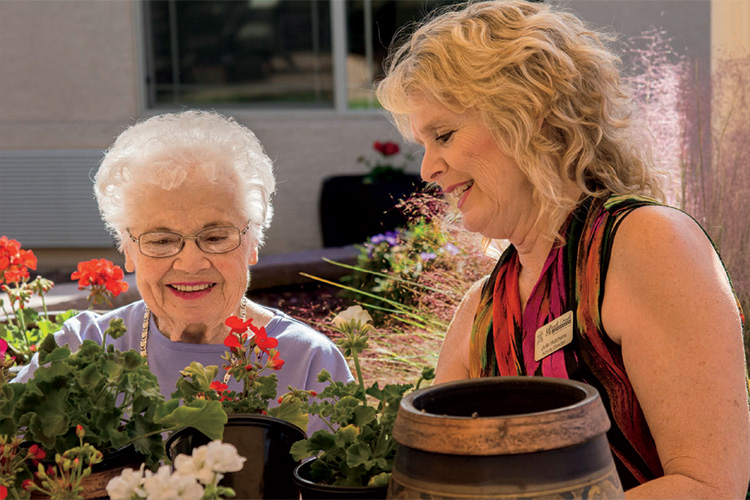
Caring for a loved one with Alzheimer’s disease or other related dementia can be very stressful, both emotionally and physically, according to Denise Kish, administrator of Mount Pleasant Gardens.
Opening late this spring, Mount Pleasant Gardens, located at 1025 Hungryneck Blvd., is a stand-alone community for Alzheimer’s and dementia care and is managed by JEA Senior Living, a leader in the field for over 30 years.
“Caregivers feel a sense of responsibility for the well-being of their loved one,” said Kish. “If the stress of caregiving is left unchecked, it can take a toll on your health, relationships and state of mind, eventually leading to burnout. When you are burned out, it is tough to do anything, let alone care for someone else.”
A specialized memory care community can do more than simply manage the most difficult phases of memory loss – it can provide meaningful and enriching experiences in a safe and welcoming environment. However, Kish said, not all memory care programs are the same and individuals and families should specifically look for communities that are dedicated to understanding the individual’s unique attributes and are designed to meet their needs.
Memory care communities should:
Help people remain independent to the best of their ability and give them space to move about as they explore. Said Kish, “Environments that help provide familiar atmospheres of home, sharing time with others and the ability to continue to rediscover those things that the individual enjoyed during their life all contribute to the caring environment.”
Offer physical activities from walking tours and visits around the home to exercise classes to sustain and improve mobility to musical and puzzle-solving activities to engage the mind. “Music is so meaningful to a memory care environment. Music and rhythm continue to be present even in advanced Alzheimer’s – it provides memory recall and peace,” Kish said.
Provide a place for socialization. “Residents find a sense of acceptance when interacting with others who experience memory loss. Often, they find a sense of community and learn to cope with their condition easier when in the presence of those in a similar position to themselves,” Kish pointed out.
Enhance the loving connection between families and their loved ones. “Dr. Gary Chapman, who wrote the ‘The 5 Love Languages,’ recently applied them to the Alzheimer’s person and their family,” Kish said. “The love languages help to connect both the family and the loved one to continued quality time and meaningful events. Because love and connection remain regardless of the stage of the disease, an environment that continues to connect the families and loved one to each other, beyond just an occasional party, will provide continued beauty to that love relationship.”
Kish added it is difficult to make the decision to move a loved one to a memory care community. “You will experience a feeling of uncertainty, guilt and grief. This is normal. Facing this decision for your loved one begins by understanding not who they were but rather who they are today.
“The staff at Mount Pleasant Gardens is ready to understand your loved one through its Meaningful Moments programming and helps you continue to keep love alive in your relationship,” Kish concluded.
By John Torsiello
To learn more, visit www.jeaseniorliving.com or call 843-216-1001.
